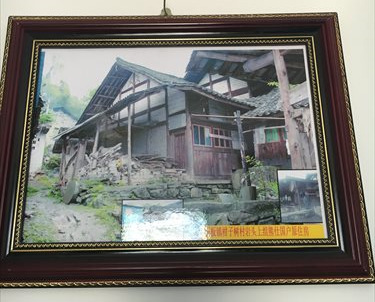
Xiong Shiguo's old house in Ganzishu village, a mountain village in north Guizhou. (Photo: GT/Zhang Yu)
Investment
To attract more villagers to sign up for the project, the government has promised them free houses, training, jobs and the prospect of integration into urban life with all the benefits that entails. The government has pledged to spend 35,000 yuan on every resident who agrees to move. Xiong's family of five received 175,000 yuan. The house and decoration cost about 160,000 yuan, and the rest was given to him in cash as subsidies.
His three-bedroom home is equipped with modern appliances, an ultra-thin television and a flush toilet. After taking part in a training course organized by the local government, he is now able to operate his apartment's range hood and washing machine - neither of which he had ever used before.
The biggest difficulty facing the farmers is finding work. Farmers who have lived their whole lives in the mountains generally lack the skills that are required in a modern city. Local governments are trying to change this by organizing training and job fairs. Wang Xiali, director of Bozhou's Reservoir and Ecological Migration Bureau, said 45 of the 170 people already relocated have found a job, some working as security guards and cleaners in the neighborhood, some in nearby factories and construction sites.
Xiong found a job on a nearby construction site, earning approximately 3,000 yuan a month. His wife got a job as a cleaner in the neighborhood, with a monthly income of around 1,600 yuan. This doesn't sound like much, but altogether it is only 400 yuan less than their previous annual income.
Chen Shujin, another beneficiary, aged 50, who was relocated from Guiyuanlin village in Yuanhou county to the city of Chishui, now works in a nearby factory, where he chops bamboo and earns an income of 2,000 yuan a month. "Previously there was no way I can save any money. Now I can save," he said.
Love the land
While some of the skills required for living in a city can be learned, some can't, and farmers' emotional attachment to their land means getting used to urban life won't be easy.
Much as Xiong likes his current life, he says he misses his old home - and his old farming life - and often returns to take a look at it.
It will soon be knocked down, according to his agreement with the government, and trees will be grown on his farmland in an effort to mitigate and prevent soil erosion. The local government takes pride in the plan, calling it an "ecological relocation" that will help reduce the quantity of Guizhou given over to farmland and protect the environment.
But some experts think it's dangerous for farmers to give up on farming. "Farmlands are the basic life guarantee and social insurance for China's millions of farmers. They should not be allowed to be transacted or given up - even though urbanization is a good thing," He Xuefeng, an expert on rural affairs at Huazhong University of Science & Technology, wrote in a column published in China Business News magazine.
The Chinese authorities think as long as they are equipped with houses, jobs and the same welfare as city dwellers, they will gradually get used to their modern life in the cities.
"If farmers are still farmers in the cities, they can only be lifted out of poverty temporarily. This is not a long-term solution," Liu Yuankun, vice governor of Guizhou Province, said in a press conference organized by the Information Office of the State Council this month.
The government says it will try to move villagers from the same village together - so that old neighbors will still be neighbors in their new neighborhood. But it will be difficult to preserve the rural culture and social networks that can only exist in the villages.
It's hard to predict what will become of these migrants. Some villagers find it hard to give up on farming. Near their new modern neighborhood, Xiong's wife Hu Huimei managed to find a small pot of land. She pays several hundred yuan a year for it and grows vegetables.


















































